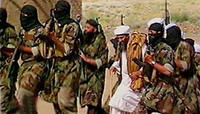-
Germany braces for terrorist strikes
Germany is bracing for possible terrorist attacks amid growing signs that Islamic extremists are preparing at least one assault somewhere in the country in the coming weeks, possibly in the capital, Berlin; authorities in Berlin are racing to track two suspected suicide bombers believed to be planning to strike a prominent location; police are combing through travel and visa records and scrutinizing arrivals from the Mideast and South Asia as they hunt the pair; meanwhile, German officials say that a second group of terrorists is reported to be planning to travel to Germany in the coming weeks to launch a small-arms attack on one or more urban centers in the next three months
-
-
Non-lethal device deters hostile divers
Hostile divers may be deterred from approaching U.S. Navy ships, sea ports, off-shore oil rigs, and other infrastructure facilities with an acoustic device that overwhelms them with the amplified sound of their own breath; the device generates low frequency underwater sound that interferes with breathing, induces disorientation, panic, uncontrolled ascent to surface, and decompression sickness
-
-
U.S., Kazakhstan complete secret transfer of Soviet-era nuclear materials
In the largest such operation ever mounted, U.S. and Kazakh officials transferred 11 tons of highly enriched uranium and 3 tons of plutonium some 1,890 miles by rail and road across the Central Asian country; the nuclear material, which could have been used to make more than 770 bombs, was moved from a facility feared vulnerable to terrorist attack to a new high-security facility
-
-
China "hijacked" sensitive U.S. Internet traffic to Chinese servers
Highly sensitive Internet traffic on U.S. government and military Web sites was briefly “hijacked” and routed through Chinese servers earlier this year; for eighteen minutes on 8 April, a Chinese state-owned telecommunications firm rerouted e-mail traffic to and from Web sites of the U.S. Senate, the Department of Defense, along with “many others” including NASA and Department of Commerce
-
-
TSA: Religion offers no exemption from airport screening

An airline passenger was thrown out of the San Diego airport for rejecting a full-body scan and pat-down groin check and instead insisting on passing through a metal detector; the Transportation Security Administration (TSA) says the agency will not allow airline passengers to get out of body imaging screening or pat-downs based on their religious beliefs; TSA chief John Pistole said that passengers who refuse to go through a full-body scanner machine and reject a pat-down will not be allowed to board, even if they turned down the in-depth screening for religious reasons; “That person is not going to get on an airplane,” Pistole said yesterday in a congressional committee testimony
-
-
Militants kidnap 7 from Nigerian Exxon platform
After the 9/11 attacks, Bin Laden boasted that he used an operation which cost al Qaeda $500,000 to finance to inflict a $500 billion damage on the U.S. economy; this was not a mere boast: experts say it was an indication that econo-jihad was an integral part of al Qaeda’s strategy to weaken and defeat the West; the recent BP disaster offered an example of one tactics terrorists may pursue in order to inflict serious economic and environmental damage on the United States and other countries: attack off-shore oil rigs: these rigs are utterly vulnerable to attack, and the damage such an attack can do is considerable; in Nigeria, a militant organization is already attacking oil rigs — if, for now, only to kidnap rig workers in order to blackmail their employers for money and political concessions; the ease with which such attacks are carried out should give all of us a pause
-
-
U.S. snoops scan the Web for potential terror risks
The U.S. government created a special center prior to Barack Obama’s inauguration for analyzing oceans of data passing through Facebook, Twitter, and other sites in an attempt to identify hazards; personnel at DHS’s National Operations Center scan the Web using dozens upon dozens of key search terms and phrases, among them “militia,” “cops,” “riot,” “dirty bomb,” “Mexican army,” “decapitated,” “Iraq,” “radicals,” and many more
-
-
U.K. General: West cannot defeat al Qaeda militarily

General Sir David Richards, a former NATO commander in Afghanistan, said Islamist militancy would pose a threat for at least thirty years, and that a clear-cut victory over militants was not achievable; Richards also said that that extremist Islamism could not be eradicated as an idea; “The trick is the balance of things that you’re doing and I say that the military are just about, you know, there. The biggest problem’s been ensuring that the governance and all the development side can keep up with it within a time frame and these things take generations sometimes within a time frame that is acceptable to domestic, public and political opinion”
-
-
Law enforcement agencies dig deeper into applicants' digital past
More and more police departments are digging deep into the social media accounts of applicants, requesting that candidates sign waivers allowing investigators access to their Facebook, MySpace, YouTube, Twitter, and other personal spaces; some agencies are demanding that applicants provide private passwords, Internet pseudonyms, text messages, and e-mail logs; of “particular concern” to law enforcement agencies is that defense lawyers could use officers’ posts to undercut their credibility in court
-
-
Mail bomb timed to explode over eastern U.S.

British police investigators say that forensic evidence showed the explosive device hidden inside an ink cartridge, originally sent from Yemen by way of Cologne, Germany, was timed to be detonated about six to seven hours after the cargo aircraft carrying it left the United Kingdom for the United States — meaning that it could have exploded over the East Coast of the United States; the UPS cargo plane intercepted in England left the country without the package at 11:20 p.m. ET on 28 October, two hours after landing, police said; the device was timed to be activated at 5:30 a.m. ET, said British police
-
-
New congressional majority could scale back U.S. science budgets
President Barack Obama has ordered all federal agencies that are not linked to national security to reduce by 5 percent their budget requests for 2012 compared to the 2011 budget year; if Republicans hold to their pre-election pledge, non-defense related federal research spending could dip more than 12 percent to around $58 billion — compared to $66 billion requested by the White House for 2011
-
-
U.S. intensifies drone war in Yemen

The U.S. is intensifying the drone war over Yemen; yesterday the Yemeni foreign minister admitted for the first time that the U.S. was helping out in the Yemeni fight with unmanned drones; the foreign minister said that while the U.S. was providing intelligence, “The (drone) attacks are undertaken by the Yemeni air force” (officials in Yemen have habitually claimed those sorties were the work of the Yemeni air force, although Yemen has neither the aircraft nor the air crews able to conduct these precision attacks); a tug-of-war is going on in Washington on whether the drone war should be conducted by the U.S. military or the CIA; unconfirmed news reports claim that in early November the U.S. moved a squadron of Predator drones to a secret base at the Yemeni Red Sea port of Al Hodaydah
-
-
Nuclear bomb forensics will identify who planted it
In 2009 researchers from the Institute for Transuranium Elements in Karlsruhe, Germany, showed that when smuggled nuclear material is intercepted, its source can be deduced from details of its composition; gleaning forensic information from an exploded nuclear bomb, though, is a different matter — but scientists argue that this, too, can be done
-
-
Growing worries about terrorism in Indonesia

With President Barack Obama set to begin a visit Tuesday to Indonesia, the world’s most populous Muslim country — and where he lived from age 6 to 10 — there is renewed attention on terrorists in Indonesia — terrorists who, in the past year, appeared to be banding together into a new al Qaeda-influenced insurgency; since 2006 the Pentagon has sent about $60 million in military aid to Indonesia for a new regional maritime warning system; as much as $20 million more is in the pipeline; the military steer arrested terrorists into a rehabilitation program; the policy is rooted in a fundamental belief that militants are fellow Muslims who have gone astray and that they are inherently reformable
-
-
Al Qaeda plot to use kamikaze dogs failed
Al Qaeda operatives in Iraq tried to bring a plane down by deploying a pair of kamikaze canines on a U.S.-bound airplane; terrorists placed the bombs inside the dogs’ bodies, then took the dogs to the Baghdad airport in kennel carriers, destined for a flight to the United States; the plot failed because the bombs were so poorly stitched inside the dogs, that the dogs died
-
More headlines
The long view
Factories First: Winning the Drone War Before It Starts
Wars are won by factories before they are won on the battlefield,Martin C. Feldmann writes, noting that the United States lacks the manufacturing depth for the coming drone age. Rectifying this situation “will take far more than procurement tweaks,” Feldmann writes. “It demands a national-level, wartime-scale industrial mobilization.”
No Nation Is an Island: The Dangers of Modern U.S. Isolationism
The resurgence of isolationist sentiment in American politics is understandable but misguided. While the desire to refocus on domestic renewal is justified, retreating from the world will not bring the security, prosperity, or sovereignty that its proponents promise. On the contrary, it invites instability, diminishes U.S. influence, and erodes the democratic order the U.S. helped forge.
Fragmented by Design: USAID’s Dismantling and the Future of American Foreign Aid
The Trump administration launched an aggressive restructuring of U.S. foreign aid, effectively dismantling the United States Agency for International Development (USAID). The humanitarian and geopolitical fallout of the demise of USAID includes shuttered clinics, destroyed food aid, and China’s growing influence in the global south. This new era of American soft power will determine how, and whether, the U.S. continues to lead in global development.
Water Wars: A Historic Agreement Between Mexico and US Is Ramping Up Border Tension
As climate change drives rising temperatures and changes in rainfall, Mexico and the US are in the middle of a conflict over water, putting an additional strain on their relationship. Partly due to constant droughts, Mexico has struggled to maintain its water deliveries for much of the last 25 years, deliveries to which it is obligated by a 1944 water-sharing agreement between the two countries.
How Disastrous Was the Trump-Putin Meeting?
In Alaska, Trump got played by Putin. Therefore, Steven Pifer writes, the European leaders and Zelensky have to “diplomatically offer suggestions to walk Trump back from a position that he does not appear to understand would be bad for Ukraine, bad for Europe, and bad for American interests. And they have to do so without setting off an explosion that could disrupt U.S.-Ukrainian and U.S.-European relations—all to the delight of Putin and the Kremlin.”
How Male Grievance Fuels Radicalization and Extremist Violence
Social extremism is evolving in reach and form. While traditional racial supremacy ideologies remain, contemporary movements are now often fueled by something more personal and emotionally resonant: male grievance.
